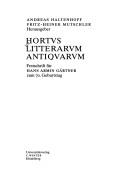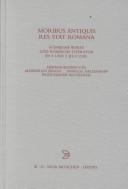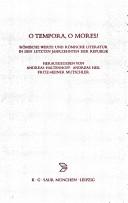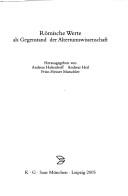| Listing 1 - 10 of 12 | << page >> |
Sort by
|
Book
Year: 1998 Publisher: New York, NY ; Bern : Peter Lang,
Abstract | Keywords | Export | Availability | Bookmark
 Loading...
Loading...Choose an application
- Reference Manager
- EndNote
- RefWorks (Direct export to RefWorks)
Book
ISBN: 3631334400 Year: 1998 Volume: 113 Publisher: Frankfurt am Main New York Peter Lang
Abstract | Keywords | Export | Availability | Bookmark
 Loading...
Loading...Choose an application
- Reference Manager
- EndNote
- RefWorks (Direct export to RefWorks)
Dialogues, Latin --- -Philosophy --- Philosophy, Ancient --- Ancient philosophy --- Greek philosophy --- Philosophy, Greek --- Philosophy, Roman --- Roman philosophy --- Mental philosophy --- Humanities --- Latin dialogues --- Latin literature --- History and criticism --- Antiochus of Ascalon --- Cicero, Marcus Tullius --- Lucullus --- Lowinsky, Ruth --- T︠S︡it︠s︡eron, Mark Tulliĭ --- Cyceron --- Cicéron --- Kikerōn --- Cicerón, M. Tulio --- Ḳiḳero --- Cicerone --- Cicerón, Marco Tulio --- Ḳiḳero, Marḳus Ṭulyus --- Tullius Cicero, Marcus --- Kikerōn, M. T. --- Cicerone, M. T. --- Cicerone, M. Tullio --- Cicero --- Cicero, M. T. --- Cyceron, Marek Tulliusz --- ציצרון, מארקוס טולליוס --- קיקרו, מארקוס טוליוס --- קיקרו, מרקוס טוליוס --- キケロ --- 西塞罗 --- Cicéron, Marcus --- Philosophy --- Lucullus, --- Antiochus, --- Cicero, Marcus Tullius. --- Antiochos, --- Leykollos, --- Lucius Licinius Lucullus, --- Lucullo, --- Lucullus, Lucius Licinius, --- Antioch,

ISBN: 3825310574 9783825310578 Year: 2000 Volume: 109 Publisher: Heidelberg: Winter,
Abstract | Keywords | Export | Availability | Bookmark
 Loading...
Loading...Choose an application
- Reference Manager
- EndNote
- RefWorks (Direct export to RefWorks)
Classical philology --- Philologie ancienne --- Gärtner, Hans Armin, --- Classical philology. --- Gärtner, Hans Armin, --- Philology, Classical --- Classical antiquities --- Greek language --- Greek literature --- Greek philology --- Humanism --- Latin language --- Latin literature --- Latin philology --- Gärtner, Hans Armin --- Classical literature --- History and criticism

ISBN: 3598776837 311187351X 3110956705 Year: 2000 Volume: 134 Publisher: München K. G. Saur
Abstract | Keywords | Export | Availability | Bookmark
 Loading...
Loading...Choose an application
- Reference Manager
- EndNote
- RefWorks (Direct export to RefWorks)
Ennius' well-known saying that "the Roman cause rests upon the old men and customs" highlights appropriately the significance of the 'mos maiorum' in Roman society, as the epitome of values, precedents and conventions, understood as obligations inherited from the forefathers. Besides essays on the various literary forms of communication dealing with the 'mos maiorum', the depiction of Roman values in the archeological record is also covered.
Latin literature --- -Roman literature --- Classical literature --- Classical philology --- Latin philology --- History and criticism --- Rome --- History --- -Latin literature --- History and criticism. --- -History and criticism
Book
ISBN: 1283428997 9786613428998 3110213273 3110212986 Year: 2011 Publisher: De Gruyter, Inc.
Abstract | Keywords | Export | Availability | Bookmark
 Loading...
Loading...Choose an application
- Reference Manager
- EndNote
- RefWorks (Direct export to RefWorks)
This edited volume, which has its origins in a Collaborative Research Centre (Sonderforschungsbereich) in Dresden, "Institutionality and Historicity", deals with the relationship between Roman values and the political strategies and changing social roles of the early Principate as reflected in contemporary literary communication.
Latin literature --- History and criticism --- Rome --- Civilization. --- Politics and government --- Augustus. --- Roman Culture. --- Roman Literature. --- Roman Principate. --- Roman Values.

ISBN: 3598777205 3110943727 Year: 2003 Volume: 171 Publisher: München Leipzig K.G. Saur
Abstract | Keywords | Export | Availability | Bookmark
 Loading...
Loading...Choose an application
- Reference Manager
- EndNote
- RefWorks (Direct export to RefWorks)
Die zunehmende Auflösung der soziopolitischen Ordnung in der ausgehenden römischen Republik erfaßte auch das System allgemein verbindlicher Werte. Wie sich die literarische Kommunikation der Zeit zu dieser Entwicklung verhielt, untersuchen die hier versammelten Beiträge. Sie sind, wie bereits der Band 'Moribus antiquis res stat Romana' zur römischen Literatur des 3. und 2. Jhs. v. Chr. (BzA 134), aus dem Dresdner Sonderforschungsbereich 'Institutionalität und Geschichtlichkeit' hervorgegangen. Neben den literarischen Texten werden epigraphische und archäologische Zeugnisse berücksichtigt.
Latin literature --- History and criticism --- Values --- Inscriptions, Latin --- Valeurs (Philosophie) --- Littérature latine --- Inscriptions latines --- Histoire et critique --- Rome --- History --- Histoire
Book
ISBN: 9783110212983 Year: 2011 Publisher: Berlin ; New York Walter de Gruyter
Abstract | Keywords | Export | Availability | Bookmark
 Loading...
Loading...Choose an application
- Reference Manager
- EndNote
- RefWorks (Direct export to RefWorks)
Latin literature --- Rome --- Roman literature --- Classical literature --- Classical philology --- Latin philology --- History and criticism --- Civilization --- Politics and government

ISBN: 3598778392 311094569X Year: 2005 Publisher: München K.G. Saur
Abstract | Keywords | Export | Availability | Bookmark
 Loading...
Loading...Choose an application
- Reference Manager
- EndNote
- RefWorks (Direct export to RefWorks)
Digital

ISBN: 9783110213270 9783110212983 Year: 2011 Publisher: Berlin ;; Boston De Gruyter
Abstract | Keywords | Export | Availability | Bookmark
 Loading...
Loading...Choose an application
- Reference Manager
- EndNote
- RefWorks (Direct export to RefWorks)
Digital

ISBN: 9783110945690 9783598778391 Year: 2012 Publisher: Leipzig B. G. Teubner
Abstract | Keywords | Export | Availability | Bookmark
 Loading...
Loading...Choose an application
- Reference Manager
- EndNote
- RefWorks (Direct export to RefWorks)
| Listing 1 - 10 of 12 | << page >> |
Sort by
|

 Search
Search Feedback
Feedback About UniCat
About UniCat  Help
Help News
News